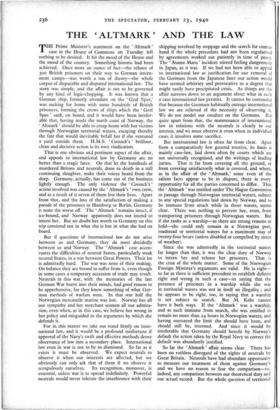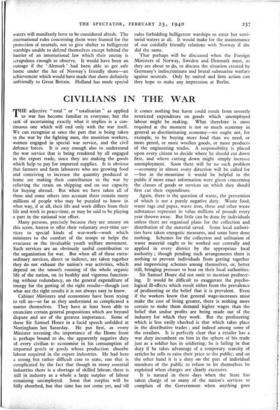THE ALTMARK ' AND THE LAW T HE Prime Minister's statement
on the Altmark ' case in the House of Commons on Tuesday left nothing to be desired. It hit the mood of the House and the mood of the country. Something historic had been achieved. Once more an ounce of fact—the release of 30o British prisoners on their way to German intern- ment campS—was worth a ton of theory—the whole corpus of disputable and disputed international law. The story was simple, and the affair is not to be governed by any kind of logic-chopping. It was known that a German ship, formerly attendant on the ' Graf Spee,' was making for home with some hundreds of British prisoners, forming the crews of ships which the ' Graf Spee ' sank, on board, and it would have been intoler- able that, having made the north coast of Norway, the Altmark ' should be able to creep home with her victims through Norwegian territorial waters, escaping thereby the fate that would inevitably befall her if she ventured a yard outside them. H.M.S. ' Cossack's ' clean and decisive action is its own vindication.
That is one obvious and pertinent aspect of the affair, and appeals to international law by Germany are no better than a tragic farce. On that let the hundreds of murdered Britons and neutrals, done to death in a still continuing slaughter, make their voices heard from the deep. Germany, actually, has come out of the business lightly enough. The only violence the ' Cossack's ' action involved was caused by the Altmark's ' own crew, and as a result of it seven of them lost their lives. Apart from that, and the loss of the satisfaction of making a parade of the prisoners in Hamburg or Berlin, Germany is none the worse off. The Altmark ' remains intact, if ice-bound, and Norway apparently does not intend to intern her. But no doubt her worth to Germany on this trip consisted not in what she is but in what she had on board.
But if questions of international law do not arise between us and Germany, they do most decidedly between us and Norway. The Altmark ' case accen- tuates the difficulties of neutral States, particularly weak neutral States, in a war between Great Powers. Their lot is admittedly hard. The war was none of their making. On balance they are bound to suffer from it, even though in some cases a temporary accession of trade may result. Neutrals in this war, with the memories of the last German War burnt into their minds, had good reason to be apprehensive, for they knew something of what Ger- man methods of warfare were. In that war half the Norwegian mercantile marine was lost. Norway has all our sympathy and her merchant seamen all our admira- tion, even when, as in this case, we believe her wrong in her policy and misguided in the arguments by which she defends it.
For in this matter we take our stand firmly on inter- national law, and it would be a profound misfortune if approval of the Navy's swift and effective methods drove observance of law into a secondary place. International law even in war is not to be so dismissed. So far as it exists it must be observed. We expect neutrals to observe it when our interests are affected, but we obviously can only ask that of them if we observe it scrupulously ourselves. Its recognition, moreover, is essential, unless war is to spread indefinitely. Powerful neutrals would never tolerate the interference with their shipping involved by stoppage and the search for contra- band if the whole procedure had not been regularised by agreements worked out patiently in time of peace. The Asama Maru ' incident stirred feeling dangerously in Japan, as it was. If we had not been able to appeal to international law as justification for our removal of the Germans from the Japanese liner our action would have seemed arbitiary and provocative to a degree that might easily have precipitated crisis. As things are the affair narrows down to an argument about what in such a case international law permits. It cannot be contended that because the Germans habitually outrage international law we are relieved of the necessity of observing it. We do not model our conduct on the Germans. But quite apart from that, the maintenance of international law in relations with the neutrals is clearly to our interest, and we must observe it even when in individual cases it involves some sacrifice.
But international law is often far from clear. Apart from a comparatively few general treaties, its basis is mainly case-law, laid down often by courts which are not universally recognised, and the writings of leading jurists. That is far from covering all the ground, or from covering satisfactorily what is covered, and where, as in the affair of the Altmark,' some even of the salient facts appear to be in dispute, there is every opportunity for all the parties concerned to differ. That the Altmark ' was entitled under The Hague Convention to passage through Norwegian territorial waters, subject to any special regulations laid down by Norway, and to be immune from attack while in those waters, seems clear. There was nothing to prevent her, even, from transporting prisoners through Norwegian waters. But if she ranks as a warship—as there are strong reasons to hold—she could only remain in a Norwegian port, roadstead or territorial waters for a maximum stay of twenty-four hours (unless disabled or compelled by stress of weather).
Since she was admittedly in the territorial waters far longer than that, it was the clear duty of Norway to intern her and release her prisoners. That is the crux of the whole matter. Some of the Norwegian Foreign Minister's arguments are valid. He is right— so far as there is sufficient precedent to establish definite right and wrong in such a case—in saying that the presence of prisoners in a warship while she was in territorial waters was not in itself an illegality ; and he appears to be right, too, in saying that a warship is not subject to search. But M. Koht cannot have it both ways. If the Altmark ' was a warship, and as such immune from search, she was entitled to remain no more than 24 hours in Norwegian waters, and having outstayed the limit she should have been, and should still be, interned. And since it would be intolerable that Germany should benefit by Norway's default the action taken by the Royal Navy to correct the default was abundantly justified.
So far the Altmark ' affair seems clear. There has been no ruthless disregard of the rights of neutrals by Great Britain. Neutrals have had abundant opportunity to measure our treatment of them against Germany's and we have no reason to fear the comparison—or, indeed, any comparison between our theoretical duty and our actual record. But the whole question of territorial waters will manifestly have to be considered afresh. The international rules concerning them were framed for the protection of neutrals, not to give shelter to belligerent warships unable to defend themselves except behind the barrier of an international law which their enemy is scrupulous enough to observe. It would have been an outrage if the Altmark ' had been able to get safe home under the lee of Norway's friendly shore—an achievement which would have made that shore definitely unfriendly to Great Britain. Holland has made special rules forbidding belligerent warships to enter her terri- torial waters at all. It would make for the maintenance of our cordially friendly relations with Norway if she did the same.
That perhaps will be discussed when the Foreign Ministers of Norway, Sweden and Denmark meet, as they are about to do, to discuss the situation created by Germany's indiscriminate and brutal submarine warfare against neutrals. Only by united and firm action can they hope to make any impression at Berlin.







































 Previous page
Previous page